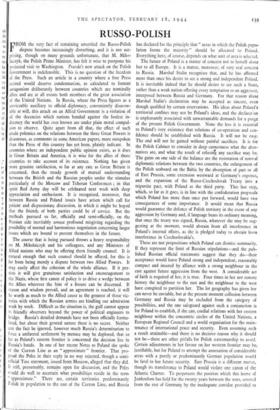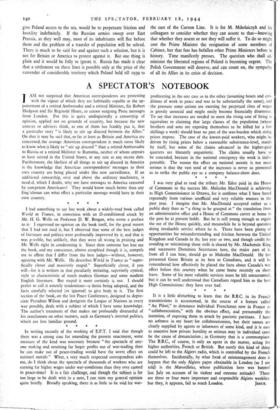RUSSO-POLISH
ROM the very fact of remaining unsettled the Russo-Polish dispute becomes increasingly disturbing, and it is not sur- prising, though on many grounds unfortunate, that M. Miko- laiczyk, the Polish Prime Minister, has felt it wise to postpone his projected visit to Washington. Pravda's new attack on the Polish Government is indefensible. This is no question of the freedom of the Press. Such an article in a country where a free Press existed would deserve condemnation, as calculated to foment antagonism deliberately between countries which are nominally allies and are at all events both members of the great association of the United Nations. In Russia, where the Press figures as a serviceable auxiliary to official diplomacy, conveniently disavow- able at will, this attack on an Allied Government is a violation of all the decencies which nations banded against the foulest in- decency the world has ever known are under plain moral compul- sion to observe. Quite apart from all that, the effect of such crude polemics on the relations between the three Great Powers is disastrous, as comments in some American papers, more outspoken than the Press of this country has yet been, plainly indicate. In countries where an independent public opinion exists, as it does in Great Britain and America, it is wise for the allies of those countries to take account of its existence. Nothing has given more genuine satisfaction, so far at any rate as Great Britain is concerned, than the steady growth of mutual understanding between the British and the Russian peoples under the stimulus particularly of the Moscow and Teheran Conferences ; in that spirit Red Army day will be celebrated next week with deep appreciation and enthusiasm. It is recognised, moreover, that between Russia and Poland issues have arisen which call for patient and dispassionate discussion, in which it might be hoped that the friends of both parties could be of service. But the methods pursued so far, officially and semi-officially, on the Russian side inevitably arouse profound misgiving regarding the possibility of normal and harmonious negotiation concerning larger issues which are bound to present themselves in the future. The course that is being pursued throws a heavy responsibility on M. Mikolaiczyk and his colleagues, and any Ministers of Allied nations who may be offering them friendly counsel. It is natural enough that such counsel should be offered, for this is far from being merely a dispute between two Allied Powers. It may easily affect the cohesion of the whole alliance. If it per- sists it will give gratuitous satisfaction and encouragement to the Nazis, whose first canon of policy is to drive a wedge between the Allies wherever the hint of a fissure can be discerned. If reason and wisdom prevail, and an agreement is reached, it will be worth as much to the Allied cause as the greatest of those vic- tories with which the Russian armies are kindling our admiration week by week. Difficult as the situation is, the gulf cannot appear to friendly observers beyond the power of political engineers to bridge. Russia's detailed demands have not been officially formu- lated, but about their general nature there is no secret. Neither can the fact be ignored, however much Russia's determination to force a unilateral settlement by menace may be deplored, that so far as Poland's eastern frontier is concerned the decision lies in Russia's bands. In one of her recent Notes to Poland she spoke of the Curzon Line as an " approximate " frontier. That pro- posal the Poles in their reply in no way rejected, though a semi- official Tass statement, issued from Moscow, alleged that they did. It still, presumably, remains open for discussion, and the Poles Would do well to ascertain what possibilities reside in the term "approximate." There are, certain territories predominantly Polish in population to the east of the Curzon Line, and Russia has declared for the principle that "areas in which the Polish popu- lation forms the majority" should be allocated to Poland. Everything here, of course, depends on what unit of area is selected.
The future of Poland is a matter of concern not to herself alone but to all Europe. It is a matter, moreover, of very real concern to Russia. Marshal Stalin recognises that, and he has affirmed more than once his desire to see a strong and independent Poland. It is inevitable indeed that he should desire to see such a State, rather than a weak nation offering every temptation to an aggressor, interposed between Russia and Germany. For that reason alone Marshal Stalin's declaration may be accepted as sincere, even though qualified by certain reservations. His ideas about Poland's territorial confines may not be Poland's ideas, and the declarat'on is unpleasantly associated with unwarrantable demands for a purge of the present Polish Government. None the less it is essential to Poland's very existence that relations of co-operation and con- fidence should be established with Russia. It will not be easy. The end will not be gained without painful sacrifices. It is for the Polish Cabinet to consider in deep earnestness what the alter- natives are, and what the result of refusing any sacrifice may be. The gains on one side of the balance are the restoration of normal diplomatic relations between the two countries, the enlargement of the Polish seaboard on the Baltic by the absorption of part or all of East Prussia, some extension westward at Germany's expense, and the expansion of the Russo-Czechoslovak Treaty into a tripartite pact, with Poland as the third party. This last step, which, so far as it goes, is in line with the confederation proposals which Poland has more than once put forward, would have two consequences of some importance. It would mean that Russia would guarantee the defence of Polish territory in the event of any aggression by Germany and, if language bears its ordinary meaning, that once the treaty was signed, Russia, whatever she may be sug- gesting at the moment, would abstain from all interference in Poland's internal affairs, as she is pledged today to abstain from interference in Czechoslovakia's.
These are not propositions which Poland can dismiss summarily. If they represent the limit of Russian stipulations—and the pub-. lished Russian official statements suggest that they do—their acceptance would leave Poland strong and independent, reasonably compact and insured by alliance with a strong neighbour in the east against future aggression from the west. A considerable act of faith is required of her, it is true. Four times in her not remote history the neighbour to the east and the neighbour to the west have conspired to partition her. The lot geography has given her can never be enviable, but at the present moment collusion between Germany and Russia may be excluded from the category of possibilities, and the one safeguard against such a conjunction is for Poland to establish, if she can, cordial relations with her eastern neighbour within the concentric circles of the United Nations, a European Regional Council and a world organisation for the main- tenance of international peace and security. Even assuming such a result attainable—and there is no decisive .reason why it should not be—there are other pitfalls for Polish statesmanship to avoid. certain adjustments in her favour on her western frontier may bel justifiable, but for Poland to attempt the annexation of considerable areas with a purely or predominantly German population would be fatal to her future security. East Prussia is a different matter, though its transference to Poland would violate one canon of the Atlantic Charter. To perpetuate the position which this home of junkerdom has held for the twenty years between the wars, severed from the rest of Germany by the inadequate corridor provided to give Poland access to the sea, would be to perpetuate friction and hostility indefinitely. If the Russian armies sweep over East Prussia, as they well may, most of its inhabitants will flee before them and the problem of a transfer of population will be solved. There is much to be said for and against such a solution, but it is not for Britain or America to protest against it. But one thing is plain and it would be folly to ignore it. Russia has made it clear that a settlement on these lines is possible only at the price of the surrender of considerable territory which Poland held till 1939 to the east of the Curzon Line. It is for M. Mikolaiczyk and his colleagues to consider whether they can assent to that—knowing that whether they assent or not they will suffer it. To do so might cost the Prime Minister the resignation of some members of Cabinet, but that fate has befallen other Prime Ministers before in history. Time manifestly presses. The question who shall ad- minister the liberated regions of Poland is becoming urgent. The Polish Government will deserve, and can count on, the sympathy of all its Allies in its crisis of decision.



























 Previous page
Previous page